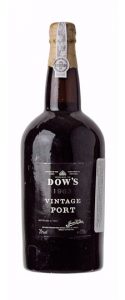Just as
aged tawny ports are created from the “best” harvests, vintage port is made from only the
finest harvests. In fact, vintage port is the most desirable of all port wines, and collectors often proclaim vintage ports to be the pinnacles of their collections. Vintage ports are very full-bodied wines with an abundance of sturdy tannins that make them loved and prized by port connoisseurs across the globe. They are well-balanced, and contain gentle fruit flavors of cherries, figs, and hints of black licorice and chocolate. (Don’t worry, even if you don’t care for black licorice you’ll probably still like vintage port; lots of folks who aren’t big licorice fans love it!)

Vintage port is made from the grapes of the finest harvests of a single year. After aging for two to three years in wood, the wine is bottled for at least fifteen years. Unlike other port wines that are meant to be consumed at the time of purchase, some vintage ports
are intended to be held onto. For instance, the majority of vintage ports from 1991 to 2003 should be purchased and kept until their flavors peak. Vintage ports that have “reached their peak” and should be enjoyed now are those from 1970, 1975, 1977, 1983, & 1998. Some vintage ports can either be consumed now, or can be held until a later date. These vintages are from 1980, 1985, 1987, & 1998. (Be aware that the years of some vintages may be approximate, since not all port houses declare the same vintage year.)
Unlike tawny port,
vintage port needs to be decanted when served. Bottles of vintage port contain a lot of sediment, and decanting helps to remove it. Consider using a sophisticated decanter like the
Riedel Tyrol wine decanter to effectively aerate and remove the sediment from your bottle of vintage port. If storing a vintage port in your wine cellar, make sure you store the bottle on its side (as you would any other wine), and keep it in a room with a maintained temperature. Ideally, a steady temperature between 55 and 60 degrees is fantastic for port. Cheers!

 Vintage port is made from the grapes of the finest harvests of a single year. After aging for two to three years in wood, the wine is bottled for at least fifteen years. Unlike other port wines that are meant to be consumed at the time of purchase, some vintage ports are intended to be held onto. For instance, the majority of vintage ports from 1991 to 2003 should be purchased and kept until their flavors peak. Vintage ports that have “reached their peak” and should be enjoyed now are those from 1970, 1975, 1977, 1983, & 1998. Some vintage ports can either be consumed now, or can be held until a later date. These vintages are from 1980, 1985, 1987, & 1998. (Be aware that the years of some vintages may be approximate, since not all port houses declare the same vintage year.)
Unlike tawny port,
Vintage port is made from the grapes of the finest harvests of a single year. After aging for two to three years in wood, the wine is bottled for at least fifteen years. Unlike other port wines that are meant to be consumed at the time of purchase, some vintage ports are intended to be held onto. For instance, the majority of vintage ports from 1991 to 2003 should be purchased and kept until their flavors peak. Vintage ports that have “reached their peak” and should be enjoyed now are those from 1970, 1975, 1977, 1983, & 1998. Some vintage ports can either be consumed now, or can be held until a later date. These vintages are from 1980, 1985, 1987, & 1998. (Be aware that the years of some vintages may be approximate, since not all port houses declare the same vintage year.)
Unlike tawny port, 